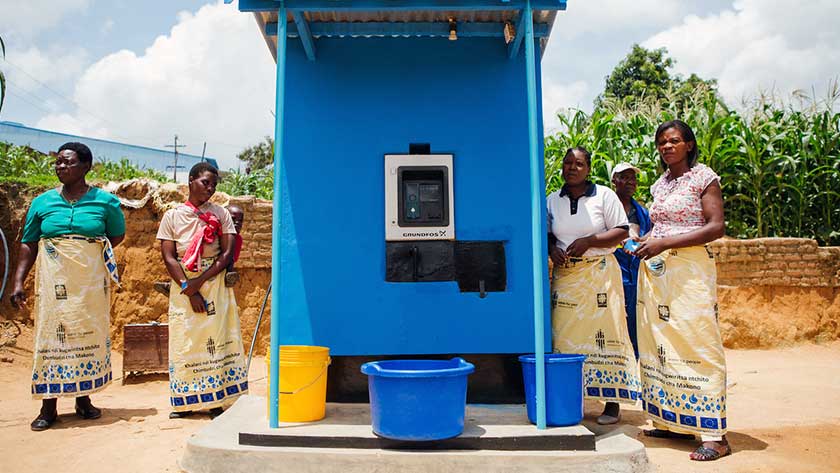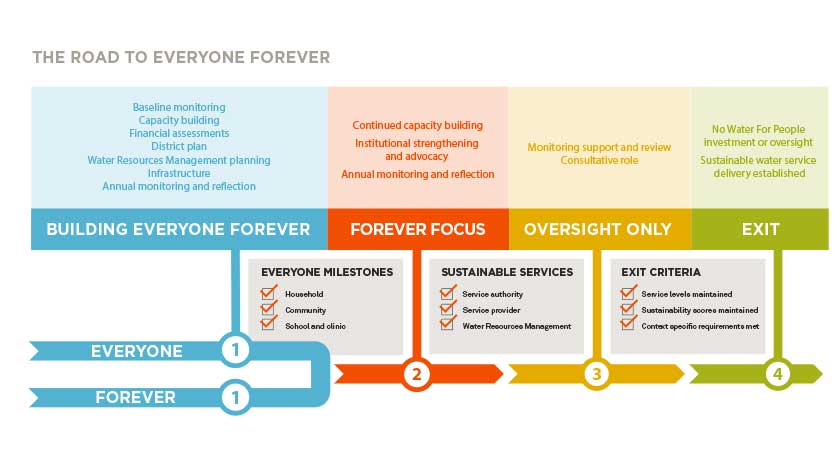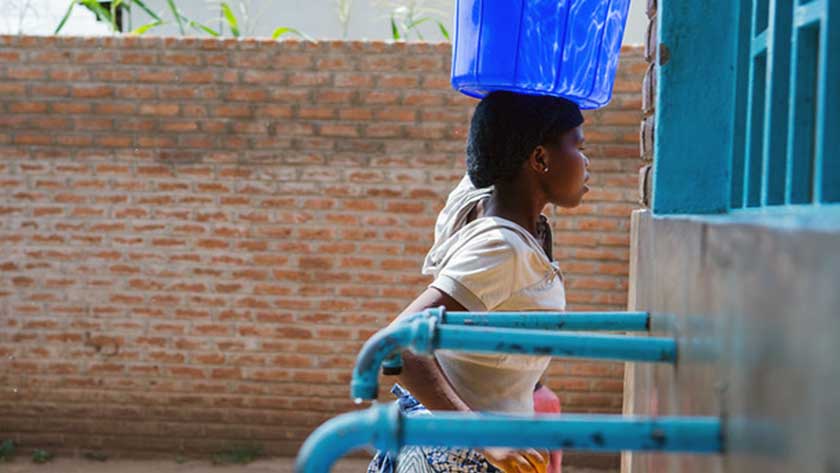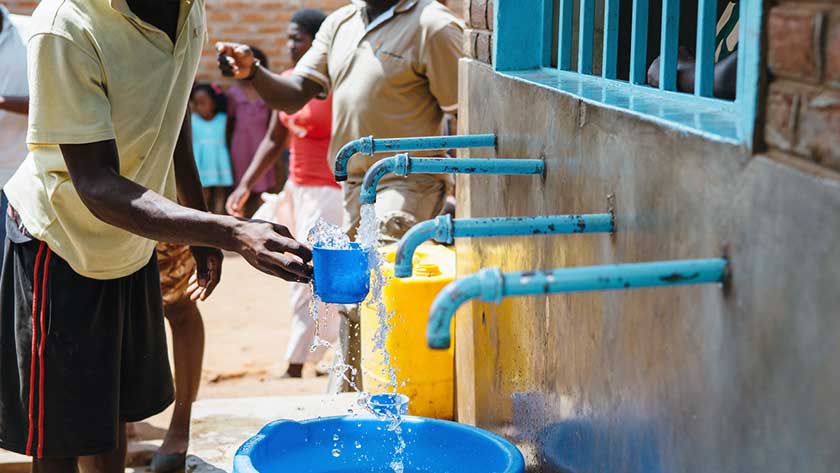It’s become clear that the participation of local people and community organizations in the design and implementation of service delivery models is critical for success. Top-down, technocratic development often fails. An alternative, participatory development philosophy has emerged in its place with the assertion that local people understand their needs and what solutions are likely to work.
Thinking has shifted from “need based” to “asset based” approaches to try to understand how best to leverage the existing social and material capital for developmental and social change. Collaborating with local people often reduces capital costs and increases local investment in operations and maintenance. This leads to greater sustainability. Water For People’s experiences in peri-urban areas of Blantyre, Malawi have uncovered key lessons from a participatory development approach to improve access to safe water supply.
Blantyre is the commercial center of Malawi with an estimated population of about one million people and an annual growth rate of 3.8 percent. Over 70 percent of the city residents live in the 21 informal settlement areas known as Low Income Areas (LIAs)—areas of both poor planning and poor provision of basic services. Here, communal water kiosks remain the main source of safe water, as many do not have their own taps. Until 2009, a range of actors, from political party leaders to influential community leaders and NGOs managed these communal water kiosks.
Water For People promotes safe water and sanitation services for every family, clinic, and school with our Everyone Forever model. We look at one district and work to ensure that every person has access to reliable and sustainable water and sanitation services. Forever means that water supplies are protected, managing institutions are functional and funded, sanitation services are available, and communities are aid-independent. It means working from the ground up and the top down—empowering both communities and governments so Water For People can exit.
Between 2009 and 2014, Water For People helped build a sustainable management model for these communal water kiosks in all Blantyre’s informal settlement areas. During this period, nine Water Users Associations (WUAs) were successfully established across 20 of the 21 LIAs to manage all communal water kiosks. A WUA is a delegated management model responsible for operating and maintaining communal water kiosks for the benefit of the whole community (Malawi Government, 2009).
As for the 21st LIA? Ndirande-Malabada has a population of about 90,000, and most tenants earn a living doing manufacturing piecemeal work with the few industries found in the city. Prior to 2009, it had no proper operator for the communal water kiosks. From 2009 to 2016, initial attempts to form a WUA failed due to heavy political interference, and several challenges:
The success stories of the WUA model in the other 20 LIAs helped Water For People advocate for improved governance of water kiosks—critical to solving the water crisis in Ndirande-Malabada. The WUA formed following these steps:
In May 2016, a WUA emerged in Ndirande-Malabada to oversee the daily operations of all 73 communal water kiosks in the area.
Monitoring is a cornerstone of sustainable service delivery and a vital tool for improvements and innovation. Water For People measures water Level of Service annually to monitor how an improved water point is meeting government standards. We look at eight core metrics to measure progress toward Level of Service at communal water kiosks.
In collaboration with Blantyre Water Board and Blantyre City Council, well-trained enumerators collect data from the LIAs. They collect primary data with the help of an app called Akvo Flow (Flow) and employed a simple random sampling method to identify the participating households. They also conducted a water point survey for all 763 communal water sources found in the LIAs.
Did the delegated management model improve water service delivery at these kiosks? Water For People measured Level of Service progress in Ndirande-Malabada pre- and post-implementation of the WUA to find out. Those results indicate a significant improvement in the physical condition of the communal water points upon the establishment of a formal management model. The percentage of water points in good physical condition and functional increased from 49 percent in 2014 to 97 percent in 2017. Furthermore, the WUA uses the financial gains from water sales to invest in the rehabilitation and construction of water points in the area, increasing from 71 to 78 in about 18 months.
Government standards dictate the appropriate number of users per improved water access point and the walking distance. Before the WUA, many more than the government standard of 480 people were using the few functioning kiosks. Monitoring results indicated that the percentage of water points meeting government standards increased from 82 percent in 2014 to 100 percent in 2017. Additionally, the Ndirande-Malabada WUA inherited unpaid bills amounting to $18,000 which they managed to settle within a period of 18 months.
Overall, water points achieving high and intermediate Levels of Service have improved from 53.8 percent to 98.6 percent within the 18-month period after the WUA assumed management of the kiosks. In 2017, the Ndirande-Malabada WUA achieved the highest Level of Service score among all 10 WUAs operating in Blantyre. Ndirande-Malabada has reached everyone at the community level through the managed kiosks and now aims to reach every household and public institution with sustainable water service delivery. Furthermore, the WUA has provided formal employment to the residents now working as water vendors, plumbers, and bookkeepers. Of these 116 employees in the Ndirande-Malabada WUA, 95 percent are women, providing opportunities for economic empowerment.
It is absolutely clear that the participatory approach of establishing WUAs has resulted in immediately improved local water service in these communities. The capacity building that comes with the WUA has also empowered the community to take charge of their water systems with local resources. In the case of Ndirande-Malabada, this delegated management model built upon existing assets in the community to successfully overcome political interference and provide sustainable water service to the community. Participatory development was key to solving the water crisis in Ndirande-Malabada.